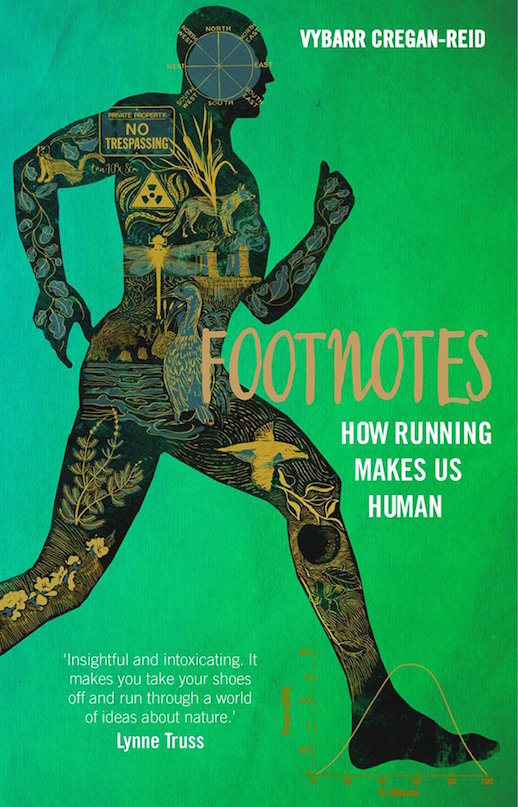 Footnotes: How Running Makes Us Human by Vybarr Cregan-Reid
Footnotes: How Running Makes Us Human by Vybarr Cregan-Reid
(Ebury Press, hardback, 352 pages. Out now.)
Review by Katharine Norbury
In 2015 Vybarr Cregan-Reid, a Reader in English at the University of Kent, was voted teacher of the year by his university’s Union. I can personally vouch for his ability to encourage and lead by example because, after reading only a few chapters of Footnotes I had attempted the seemingly impossible. Cregan-Reid had persuaded me to shift from the heel-to-toe, leisurely gait of the long distance walker that has served me well for approximately half a century (since I could walk, to be specific) and to tentatively try out the somewhat more energetic forefoot-strike of the runner. “We are becoming static,” he warned, “and our bodies are neither built nor prepared for it.”
Footnotes became my constant companion as I grappled with the NHS’s Couch to 5K exercise programme (for people who have never run anywhere in their lives) and investigated that community spirited phenomenon, and possible love-child of C25K that is Park Run (where anyone who feels like it in a given community meets at 9 am on a Saturday morning with likeminded souls to run 5 kilometres).
But this is not just a book about running. It’s a book about running outside, as opposed to in a gym, in as natural a space as our managed environments allow, and – ideally – barefoot. I’m not convinced by the barefoot, but Cregan-Reid has certainly succeeded in angling the lens through which I view my own relationship with landscape. I was drawn to the writer Roger Deakin because in Waterlog, his account of swimming across Britain, Deakin presented swimming as a means of getting from A to B, a form of transport, rather than a form of exercise. In doing so he spawned a generation of outdoor swimmers, eagerly embracing his “frog’s eye view” of our island. In a similar way Cregan-Reid has recalibrated my notions about running, so that for the first time I can see the achievements of—for example – the legendary Cumbrian fell runner Joss Naylor CBE (now in his eighties) from the perspective of his absolute engagement with a beloved and familiar place, rather than simply as an extreme exercise in peak bagging (he once ran up 72 Cumbrian peaks in 23hours and 20 minutes, involving a journey of over 100 miles and 38,000 feet of ascent. Everest is 29,030’).
Cregan-Reid’s ideas about running in nature, so-to-speak, are supported by the newest research in the field, and he introduces us to some of the world’s greatest authorities on the activity. But he is, understandably, also preoccupied with literature, and here again he succeeds in tilting the lens on writers such as Dickens, Hardy, Coleridge and other literary striders out.
At times I felt saturated with information. Footnotes isn’t a very relaxing read, but then I have always been a walker and my thought processes are perhaps slower, less frenetic, than those of my guide. But after all, it is a book – so one can pick it up and put it down at one’s leisure, without ever having to get out of an armchair. Though when you have learned of the muscular-skeletal stresses and potential for injury inherent in merely sitting in a chair you may well change your mind about doing that.
Footnotes is a blazing achievement. It burns with restless energy as Cregan-Reid, alive, alert, wholly and gloriously present, sets out his manifesto, encapsulated in his subtitle, that running makes us human. Because running is what we have evolved to do, and when we do it right we are connected both with our most authentic selves and with the landscapes through which we fleetingly pass. At one point in his travels Dr Avik Basu and Dr Jason Duvall, environmental psychologists at the University of Michigan, ask Cregan-Reid what he, as a literature professor, is doing writing a book about biomechanics, psychology and the environment, to which he replies: “I’m not really sure, but I think my answer would be the same as [yours]: because I think it matters, it’s worth doing, and it gets me out of bed in the morning.” Well here’s to that.